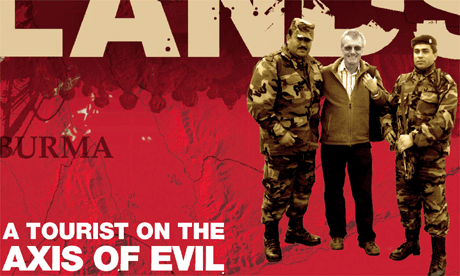
Bad Lands: A Tourist on the Axis of Evil
By Tony Wheeler
Lonely Planet £ 7.99
A couple of years ago Tony Wheeler, the patron saint of independent travel, visited all seven continents. Captain Cook was probably the first claimant of this world-embracing title, but even he didn't manage to do it within a single twelve-month period.
For almost 40 years Wheeler has travelled on the edge, doing the Asia overland hippie trail in the early 1970s, creating the first series of guidebooks for modern independent travellers, visiting 132 countries before his 60th birthday.
He is recognised from Morocco's souks to the beaches of Ko Samui. His work has shown a generation how to move through the world alone and with confidence. So where does Mr Lonely Planet go after helping us to find the most beautiful view and finest hammam in a thousand destinations? To bad lands, of course.
George W Bush's axis of evil provides his top three "pariah countries" to which he adds six more "slightly misguided, mildly malevolent, seriously off course, extraordinarily reclusive and much understood" nations. His first stop is Afghanistan to which he returns after a 34-year absence. Once a key section of the hash-and-hepatitis highway, Wheeler notes that even "the most drug-addled hippie sweating through a cold-turkey nightmare" could not have imagined the chaos unleashed since his last visit.
Instead of boarding an India-bound Magic Bus, he now checks under vehicles for bombs. Rather than smoke a hubble-bubble on Chicken Street, he finds himself drinking tea in the "locked down" British Embassy during rioting. At Bamiyan, where in 2001 the giant "un-Islamic" Buddhas were shelled with tank fire and blasted by dynamite on the order of the Taliban, he reflects on religious intolerance.
All his visits follow a similar pattern, melding travelogue with social and political commentary, sketching each country's history and recording its attitude to human rights. Not surprisingly he has a nose for illustrative facts. In Albania he learns that there are 700,000 concrete bunkers. He reveals that no unaccompanied female tourist under the age of 45 may visit Saudi Arabia. In teetotal Iran he observes that beer is smuggled into the country by the religious militia.
North Korea proves to be his strangest destination, "a place alternating between horror and comedy, a Stalinist theme park, a gulag run by Monty Python". Independent travellers of both sexes are banned from the workers' earthly paradise so Wheeler joins a tour group. Under strict control he is shepherded from the Victorious Fatherland Liberation War Museum to gymnastic dance displays by the Korean Peoples' Army. Most days begin with a deep bow to one of the many statues of the Great Leader (or "Dapper Despot") Kim Jong ll. At night he gazes out from his high-rise, cold-water hotel and sees only a single car moving in the vast, impoverished capital Pyongyang.
"You guys really are the axis of evil," his frustrated (and frightened) tour guide tells the group towards the end of their visit. "You're always leaning out of the windows and taking photographs when I tell you not to. You wander off without a guide to keep an eye on you. You giggle – giggle! – when the local guides are making speeches about the accomplishments of the Great Leader. I know there'll be a report made after this tour. I could lose my job."
A jolly jaunt around the world's most repressive and dangerous regimes would be irresponsible. Lucky western observers are in no position to joke about Burmese dictatorship or the lack of soap in Cuba. But Wheeler never forgets his good fortune. He rails fervently against injustice, especially the abuse of privilege by the elite. He has the courage to slam hypocrisy. He writes that Saudi Arabia "is a country that beheads, mutilates and flogs people, that keeps women locked away and disenfranchised in almost every way possible, that has zero democratic rights, zero religious freedom and strict state censorship and media control."
Bad Lands would have been stronger with fewer tips ("It's not a bad view and not a bad carafe of red wine for less than three dollars") and more insight into Wheeler's life. The moments are all too rare when he draws on his exceptional, globetrotting experience, as he does on a drive through Afghanistan which reminds him of Ladakh ("the same gently-folded hills, beautifully shadowed in early and late light"), Turkey, Tibet and Ethiopia. Nevertheless his direct, conversational style disarms and engages the reader, providing us with a timely and passionate view of the world by one of its most travelled sons.
In almost every "bad land" Wheeler is moved by the outgoing friendliness of ordinary men and women. He comes to see that bad is a relative term, and that there are always two sides to every story. Indeed, almost without exception, a traveller is improved by his journey. How much better a place the world would be now, Wheeler suggests, if George W had done a little foreign travel in his youth, and gained some feeling for the world outside Texas.
·Rory Maclean's latest book Magic Bus: On the Hippie Trail from Istanbul to India is published by Penguin Viking. It is available to buy from the Guardian Bookshop.

